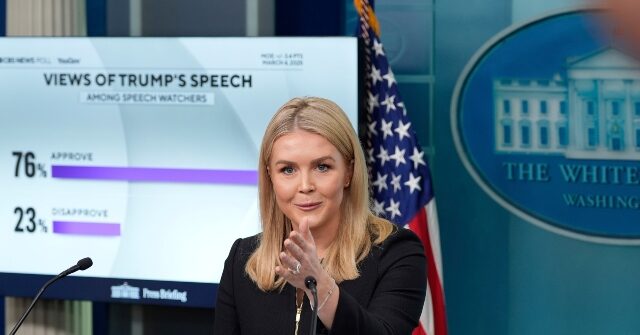Step into the bustling world of the White House as Karoline Leavitt takes the stage for another gripping press briefing. On Tuesday, March 11, the press secretary faced the cameras and microphones to tackle pressing issues and respond to the latest political developments. From President Donald Trump’s address to Congress to international trade and peace negotiations, Leavitt had her work cut out for her. Let’s dive into the highlights and what they mean for the nation.
Trump’s Address to Congress: Leavitt’s Take
In her previous briefing, Leavitt didn’t hold back when discussing Democrats’ behavior during President Trump’s address to Congress. She called out what she described as “shameful” conduct, suggesting that it was disrespectful to the office of the President and the American people.
However, Leavitt also highlighted a silver lining. She pointed to multiple polls that showed a majority of Americans approved of Trump’s speech. This positive feedback suggests that despite the political divide, many citizens resonate with the President’s message and vision for the country.
What the Polls Say
- A CNN poll found that 57% of Americans had a positive reaction to Trump’s address.
- A CBS News poll showed 76% of viewers approved of the speech.
- An ABC News/Washington Post poll indicated that 62% of respondents viewed the address favorably.
These numbers suggest that Trump’s message is reaching and resonating with a broad segment of the American population. Leavitt’s mention of these polls during her briefing underscores the administration’s focus on public support and approval.
Trade Tensions: Tariffs and Retaliation
One of the hot topics expected to come up during Leavitt’s March 11 briefing was the ongoing trade dispute between the United States and its neighbors, Canada and Mexico. President Trump’s decision to impose tariffs on these countries has sparked a wave of retaliatory measures.
The tariffs, aimed at protecting American industries, have led to increased costs for consumers and businesses alike. Leavitt likely faced questions about the administration’s strategy and how it plans to navigate these complex international waters.
The Impact of Tariffs
- Steel and aluminum tariffs have raised prices for American manufacturers.
- Canadian and Mexican retaliatory tariffs have targeted U.S. agricultural products.
- The overall economic impact remains a subject of debate and concern.
As Leavitt addressed these issues, she likely emphasized the administration’s commitment to protecting American jobs and industries. However, the ongoing trade war’s long-term effects on the economy and international relations remain uncertain.
Peace Negotiations: The Ukraine Conflict
Another critical topic on the agenda was the continuing peace negotiations aimed at ending the war in Ukraine. The conflict, which has dragged on for years, remains a significant concern for global stability and security.
Leavitt likely provided updates on the administration’s efforts to facilitate a peaceful resolution. The United States, along with its allies, has been actively involved in diplomatic efforts to bring both sides to the negotiating table.
Key Points in the Peace Process
- The U.S. supports Ukraine’s sovereignty and territorial integrity.
- Diplomatic efforts focus on ceasefire agreements and political solutions.
- International cooperation is crucial for a lasting peace in the region.
As Leavitt discussed these efforts, she likely emphasized the importance of international cooperation and the role of the United States in promoting global peace and stability. The outcome of these negotiations will have far-reaching implications for the region and the world.
Immigration and Deportation Efforts
The topic of immigration and ongoing deportation efforts of illegal aliens in the United States was also expected to be a focal point of Leavitt’s briefing. The administration has made immigration a key priority, with policies aimed at strengthening border security and enforcing immigration laws.
Leavitt likely faced questions about the impact of these policies on communities and the legal challenges they have faced. The administration’s approach to immigration remains a contentious issue, with strong opinions on both sides of the debate.
Key Aspects of Immigration Policy
- Increased border security measures, including the construction of a wall.
- Deportation efforts targeting illegal aliens with criminal records.
- Legal challenges to the administration’s immigration policies.
As Leavitt addressed these issues, she likely emphasized the administration’s commitment to upholding the rule of law and protecting American citizens. However, the debate over immigration policy continues to be a divisive and emotionally charged topic.
The Role of the Press Secretary
Karoline Leavitt’s role as White House Press Secretary is no easy task. She serves as the primary spokesperson for the administration, tasked with communicating its policies, defending its actions, and responding to the media’s questions and criticisms.
During her briefings, Leavitt must strike a delicate balance between providing information and maintaining the administration’s messaging. She faces a barrage of questions from reporters, each seeking to uncover new angles and insights into the administration’s activities.
Challenges and Responsibilities
- Communicating complex policies in a clear and concise manner.
- Defending the administration’s actions and decisions.
- Navigating the often adversarial relationship between the White House and the media.
Leavitt’s performance during these briefings can significantly impact public perception of the administration. Her ability to convey the President’s message effectively and respond to tough questions with poise and clarity is crucial to maintaining trust and credibility.
The Importance of White House Briefings
White House press briefings serve as a vital link between the administration and the American people. They provide a platform for the government to communicate its policies, actions, and priorities directly to the public through the media.
These briefings also offer an opportunity for the press to hold the administration accountable, asking questions and seeking clarification on issues of public interest. The exchange of information and ideas during these sessions is essential for a healthy democracy.
The Impact of Briefings on Public Opinion
- Briefings can shape public perception of the administration’s performance.
- They provide a forum for addressing controversies and correcting misinformation.
- The press secretary’s effectiveness can influence trust in the government.
As Karoline Leavitt continues to navigate the challenges of her role, her briefings will remain a crucial source of information and insight for the American people. The topics she addresses, from trade and international relations to immigration and domestic policy, reflect the complex issues facing the nation.
In conclusion, Karoline Leavitt’s White House press briefing on March 11 offered a glimpse into the administration’s priorities and challenges. From defending President Trump’s address to Congress to addressing trade disputes, peace negotiations, and immigration policies, Leavitt had her hands full. As the nation continues to navigate these complex issues, the role of the press secretary in communicating the administration’s stance and responding to public concerns remains more important than ever.
Source: www.breitbart.com

